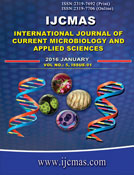


 National Academy of Agricultural Sciences (NAAS)
National Academy of Agricultural Sciences (NAAS)

|
PRINT ISSN : 2319-7692
Online ISSN : 2319-7706 Issues : 12 per year Publisher : Excellent Publishers Email : editorijcmas@gmail.com / submit@ijcmas.com Editor-in-chief: Dr.M.Prakash Index Copernicus ICV 2018: 95.39 NAAS RATING 2020: 5.38 |
A study was undertaken to assess the phytotoxic/ allelopathic potential of citonellol, a volatile monoterpene found in Eucalyptus citriodora, E. globulus, Ocimum basilicum, Zingiber of icinale, Coriandrum sativum, Citrus limon and several other aromatic plants, against two weedy species viz. Cassia occidentalis and Parthenium hysterophorus. Citonellol was found to appreciably inhibit the germination of both the weedy species even at very low concentrations. However, the effect was more pronounced on P. hysterophorus than on C. occidentalis. Likewise, the seedling growth of both the test weedy species in terms of radicle length, seedling length and seedling dry weight was appreciably reduced in response to citronellol. Not only the growth, even the content of total chlorophyll and cellular respiration in both the test weeds was reduced quite significantly, thereby indicating that citronellol has a negative effect on the photosynthetic efficiency and the energy metabolism of the weed species. Based on the study, it is concluded that citronellol possesses weed-suppressing ability and can be used for future weed management programmes either directly or by serving as a lead molecule
 |
 |
 |
 |
 |